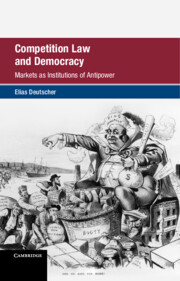Book contents
- Competition Law and Democracy
- Global Competition Law And Economics Policy
- Competition Law and Democracy
- Copyright page
- Dedication
- Contents
- Preface
- Introduction
- Part I The Historical and Conceptual Foundations of the Competition–Democracy Nexus
- 1 The Object of Inquiry
- 2 Republican Liberty as the Coupling between Competition and Democracy
- Part II The Operationalisation of the Competition–Democracy Nexus
- Part III The Decline of the Competition–Democracy Nexus
- Part IV The Revival of the Competition–Democracy Nexus
- Bibliography
- Table of Names
- Table of Cases US
- Table of Cases EU
- Table of Legislation
- Index
2 - Republican Liberty as the Coupling between Competition and Democracy
from Part I - The Historical and Conceptual Foundations of the Competition–Democracy Nexus
Published online by Cambridge University Press: 21 November 2024
- Competition Law and Democracy
- Global Competition Law And Economics Policy
- Competition Law and Democracy
- Copyright page
- Dedication
- Contents
- Preface
- Introduction
- Part I The Historical and Conceptual Foundations of the Competition–Democracy Nexus
- 1 The Object of Inquiry
- 2 Republican Liberty as the Coupling between Competition and Democracy
- Part II The Operationalisation of the Competition–Democracy Nexus
- Part III The Decline of the Competition–Democracy Nexus
- Part IV The Revival of the Competition–Democracy Nexus
- Bibliography
- Table of Names
- Table of Cases US
- Table of Cases EU
- Table of Legislation
- Index
Summary
This chapter introduces the conceptual claim of this book that the idea of a competition-democracy nexus is grounded in a normative commitment to a republican conception of economic liberty as non-domination originating in ancient Roman thought. The chapter first shows how the existing ‘special interest capture’ and ‘conventional liberty’ accounts fail to make sense of the competition–democracy nexus. It then explores the republican conception of liberty as non-domination as an alternative explanation of the idea of a competition–democracy nexus. It shows that this republican understanding of economic liberty is the only explanatory variable that can explain why competition enhances and the concentration of economic power undermines democracy and why competition law is the right tool to address this problem.
Keywords
- Type
- Chapter
- Information
- Competition Law and DemocracyMarkets as Institutions of Antipower, pp. 53 - 100Publisher: Cambridge University PressPrint publication year: 2024

